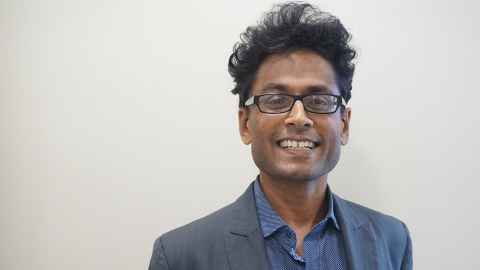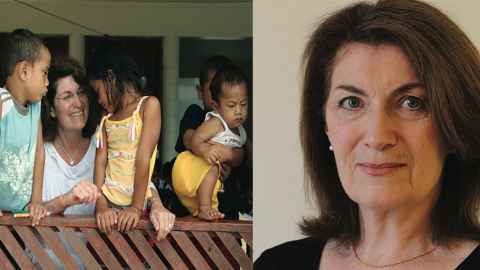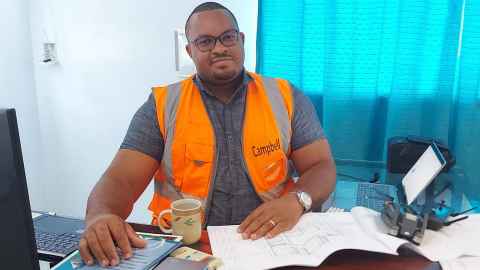The careers that keep alumni overseas despite Covid-19
25 May 2021
Plenty of people have brought their skills home because of Covid-19, but these alumni are happy to stay overseas. They talked to Anthony Doesburg for Ingenio.

It has been a privilege to learn from community health workers in villages in countries as diverse as Cambodia, Liberia and Nepal.
Kumanan Rasanathan, Phnom Penh, Cambodia
While Covid-19 has disrupted everyone’s lives, it has utterly dominated Kumanan Rasanathan’s. Kumanan studied medicine, among other subjects, at the University of Auckland in the 1990s and early 2000s, and has been in the thick of the pandemic response in Cambodia, working with the World Health Organisation (WHO).
“It has been rewarding to contribute to a national response when there was so much fear and uncertainty at the beginning of the pandemic. But my public health career, in New Zealand and at the WHO and UNICEF, has mostly been on improving health service delivery and working across sectors on social determinants and health inequalities.”
Kumanan, who graduated in 1999 with a MBChB, a Bachelor of Human Biology and a Bachelor of Arts in Politics, returned to the University in 2003 to do a Master of Public Health. For the past three years he has been working in Phnom Penh and this year will take up a role at the WHO headquarters in Geneva.
“I was the WHO Covid-19 incident manager for much of the first half of 2020 and also led the health service delivery pillar. It’s been one of the most exhilarating, challenging and stressful periods of my career.”
The position involved him in everything from helping write Cambodia’s Covid-19 plan and clinical guide-lines, to training health workers and mobilising funding and equipment.
Pandemic aside, Kumanan says the most exciting part of his job is seeing the tangible effects of policy change, which doesn’t always come easy.
“I’ve been fortunate to work in a number of different countries, in teams of people with different professional and cultural backgrounds, and at different levels. For example, I’ve helped define global development frameworks in New York, such as the Sustainable Development Goals, and I’ve engaged with heads of government and heads of state.
“But probably most rewarding for me has been the privilege of learning from community health workers in villages in countries as diverse as Cambodia, Liberia and Nepal.”
The people of Cambodia were the best feature of life there. “They are the most hospitable people to foreigners in the world, in spite of all the challenges they’ve faced over the past few decades, including from the actions of foreign countries.”
And as it has a very child-centred society, his sons thrived there.
That’s not to say he’s escaped New Zealand’s gravitational pull.
“I think expatriate New Zealanders always consider returning home to try to make a contribution. I keep strong links with New Zealand, including with the School of Population Health at the University.
“Covid-19 did mean I prioritised spending some time in Aotearoa with family and worked remotely. I thought about pursuing a role here, but in the end it was hard to turn down the new position at the WHO headquarters. In the future, who knows?”

Try to recognise and explore the quiet idea in your mind. Take lots of career breaks if you want to. The unexpected may happen.
Debbie Bartley, London, United Kingdom
When Dr Debbie Bartley set out on her career path in the 1960s, she broke new ground.
Debbie was in Auckland Medical School’s inaugural class in 1968, graduating in 1973. Then, to pursue her interest in public health – inspired by stints in the US, the African bush and Nepal – she applied for a training position in the UK’s first community-medicine department at St Thomas’s Hospital Medical School in London.
“When I graduated, my specialty of public health – or community medicine, as it was known then – barely existed. Some of the faculty had discussed concepts like population health, inequalities and political determinants of health, but it was much less common at that time.”
One lecturer showed slides of his work in the Himalayas with Sir Edmund Hillary and the Himalayan Trust, sparking Debbie to go to Nepal. While working near Kathmandu, she was introduced to Sir Ed. She ended up flying with him to the Everest region and stayed for a month in mid winter to run the trust’s Kunde Hospital.
That association with Nepal saw her take charge, years later, of the Covid-19 response in Taplejung District, nestled under Mt Kanchenjunga, near the Tibetan border.
“We sent PPE, other supplies and guidelines we'd written to the clinics, taking five days by Jeep and porters. When we could find signals, we trained staff by phone. We set up advice lines for villagers, facilitated hospital referrals and liaised with partners dealing with contact tracing.”
Nepal, with around 30 million people, has weathered the pandemic comparatively well, so far. Deaths were in the low 3,000s up to the end of April.
Debbie has worked mostly in the UK, where her proudest achievement was being made Director of Public Health for North West Surrey.
“I also enjoyed my commission with the Joint Committee on Vaccination and Immunisation, which advises UK health departments, and a fellowship with the WHO Collaborating Centre at Imperial College, London.”
Past roles include helping set up Biobank Qatar in Doha and working on disaster relief in Samoa after the September 2009 tsunami.
She lives on London’s Southbank and is a trustee and health lead for the Himalayan Trust UK, running a health programme for 9,600 villagers in Taplejung, and she sees the effect on villagers’ lives.
“As an example, many mothers and babies had died in one village the decade before we started. We helped them build and set up a new clinic and birthing centre, establish a fund for maternity emergencies, support women’s groups, and more. All mothers and babies have been safe since.”
In the depths of the pandemic, New Zealand appeared a safe haven, but she has been sitting out the pandemic in London. where she has turned her mind to a masters equivalent in Tibetan philosophy. The guidance she would offer to people following a similar path to her, is not to head in one direction just because you feel you should.
“Try to recognise and explore the quiet idea in your mind. Take lots of career breaks if you want to. The unexpected may happen.”

The most exciting aspect is being able to develop and implement projects that will improve people’s lives by reducing the risk of severe damage from disasters.
Daniel Campbell, Saint Vincent and the Grenadines, Caribbean
Appreciation for sustainability and resilience assures Daniel Campbell (Master of Engineering, 2018) of a busy future. Daniel is from Saint Vincent and the Grenadines, an archipelago in the Eastern Caribbean.
He returned there after finishing his studies and is working as an environmental sustainability consultant, responsible for technical development, management and execution of complex large-scale projects.
“The Caribbean is one of the most disaster-prone and vulnerable regions in the world. In Saint Vincent and the Grenadines, we are faced with multiple hazards ranging from hurricanes and tropical storms, floods, landslides and drought to seismic events and volcanic eruptions.”
He felt the tragic consequences of such an event in 2008, when his girlfriend’s aunt was killed in a landslide along the coastal highway of mainland St Vincent. Despite the cause being sheeted home to engineering and construction failings, under Saint Vincent and the Grenadines law, no one was held to account.
“One of the reasons I studied at Auckland was because New Zealand does a great job at managing similar disasters while pursuing a path of sustainable development.
“The most exciting aspect of my work is being able to develop and implement projects that will improve people’s lives by reducing the risk of severe damage from disasters, while preserving the environment and ecosystems.”
Not that life is all about bracing for catastrophe.
“The best parts of living here are the rivers and beaches, lush mountainous forests and vibrant culture, spread across 32 islands and cays, and local traditions mixed with moderately progressing infrastructure development.”
He feels personally motivated to lift professional standards.
“The engineering profession is not regulated here and I intend to help change that in the future.”
Daniel recalls meeting many great people in New Zealand during weekends spent travelling around the North Island and on one visit to the South Island.
“I mostly miss the people and the respect and appreciation for nature and the environment.”
Are you University of Auckland alumna working in an interesting job overseas? Do you want to tell your story? Email: ingenio@auckland.ac.nz
This article first appeared in the Autumn 2021 edition of Ingenio magazine.